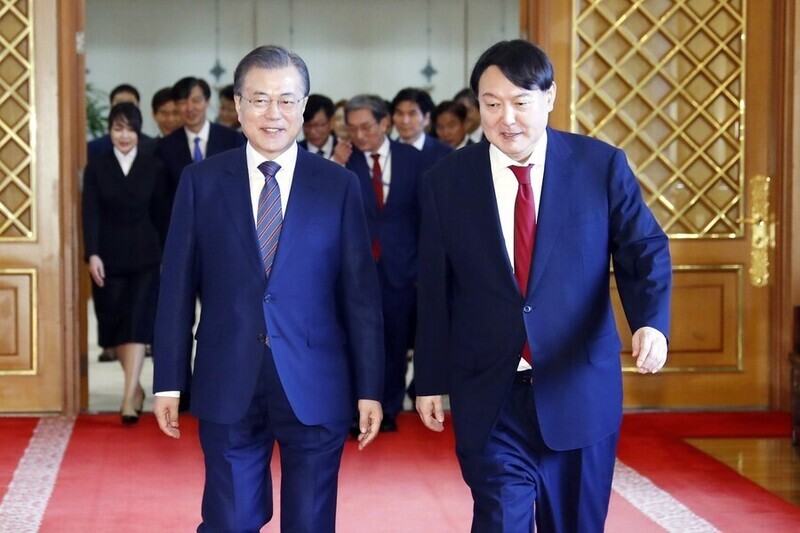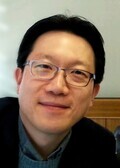hankyoreh
Links to other country sites 다른 나라 사이트 링크
[Column] Beyond the eras of Moon Jae-in and Yoon Suk-yeol


By Shin Jin-wook, professor of sociology at Chung-Ang University
Yoon Suk-yeol will be sworn in as South Korea’s next president in just a few days. However, even before the new administration officially takes office, a vast array of problems have already cast a shadow on the new government.
Some of these issues include the relocation of the presidential office, corruption by Cabinet nominees, the appointment of wealthy men in their 60s and former prosecutors as well as close friends of the president, and more.
Although the incoming government seized power by accusing the Moon Jae-in government of hypocrisy, privilege, and injustice, the public is now starting to see what real power looks like, far from Yoon’s slogans calling for fairness and common sense.
All these attitudes, such as mocking women for demanding policy responses against sexual violence, attacking disabled people who want freedom of movement, easing of Min-sik’s Law for protecting children, and trying to amend the Serious Accidents Punishment Act aimed at preventing workplace accidents. What they have in common is denigration and contempt for the socially disadvantaged. But aren’t the majority of us socially disadvantaged in some way or another? This is politics that excludes the majority of the people.
The Yoon Suk-yeol administration resembles the early days of the Lee Myung-bak administration in that the upper classes and the powerful are revealing their true colors. At the time, Lee Myung-bak and his team were calling for a change in English education in Korea to better grasp nuances in pronunciation while also pushing for the resumption of beef imports from the US, despite public concerns over mad cow disease. To this, the then-president responded with “If [the people] are uneasy, let them eat hanu,” referring to the expensive South Korean beef few can afford. Such words are naive and simply play on differences in rank between those in power and those seen as below them.
These similarities are structural in nature. After the impeachment of Park Geun-hye, Korean conservatives were convinced that the progressives were “the same” as them, so they failed to self-reflect or change their ways for the better.
Instead, the conservatives simply decided to change their party’s name and elect a party leader in his 30s shouting out slogans about the youth, millennials and Gen Z, and trying to appeal to those in their 20s and 30s. However, the selection of this party leader spectacularly backfired as he became the poster child for misogyny and is now even embroiled in disciplinary action on allegations of accepting sexual favors.
In the end, the revamp the conservatives tried to achieve within their party has simply resulted in a detour back to their old ways. Indeed, the Yoon era may be a time when the conflicts between those trying to bring the country back to pre-impeachment times and those trying to resist such a regression continue to collide.
Moreover, the president and prosecutors’ power is not the only obstacle that needs to be overcome. Perhaps the greatest reason to despair in this day and age lies in the fact that the authenticity of the good nature around the efforts made for change are being questioned. Values such as democracy, justice, equality, fairness and solidarity have all been made a mockery of. Now, what terms should we use to describe a better future?
The dissolution of the impeachment alliance has resulted in a disruption of norms and values within South Korean society — the downfall of all authority. Throughout the candlelight protests, public opinion in favor of the impeachment of President Park Geun-hye exceeded 80%, and during the early days of Moon Jae-in’s administration, the approval rating of the president reached 80%. There was national support and expectations that transcended ideology, class and regional differences.
However, after these high hopes were betrayed in reality, there was a collective feeling of disillusionment and repulsion among the public. Soaring house prices, sexual harassment and assault by politicians, and sketchy real estate contracts cannot coexist with the energy behind the candlelight protests.
This unfortunate downward trend has been surprisingly steady over the past years. Indeed, the approval rating of the Democratic Party and positive public opinion on the Moon Jae-in administration's policies have been on a downhill course for the past five years.
Even though public opinion temporarily rallied twice in 2018 and 2020, this was the result of exceptional circumstances such as the inter-Korean summits and the success of the initial response to COVID-19. At that time, local elections and general elections were held, and the ruling party won by a landslide. But these victories turned out to be a double-edged sword. The ruling party was blinded from seeing how the bottom ranks of society were slowly collapsing and falling apart.
The birth of the Yoon Suk-yeol government is the end result of all these unfortunate strings of events. The core supporters of the two major political parties will see reality based on their beliefs and standards of good and evil, but the deepest crisis in our society and politics is that the Democratic Party, the People Power Party, the progressives, and even those in the center, are no longer able to reach the hearts of the public and convey empathy and trust.
Therefore, all efforts to overcome the Yoon Suk-yeol era must seek to go beyond the Moon Jae-in era as well.
Let's look at “The Road Outside of the Road,” a collection of poems by the labor activist and poet Baek Mu-san.
“Only weeds grow in my garden / What was planted and sprouted did not receive any sunlight being in the shadows / Only the weeds bloomed flowers / The buds I planted have not even blossomed / Where did what I dreamed of go? Only unfamiliar things have taken root in my garden.”
Still, the poet says: “Nevertheless, they are still flowers that bloomed in my garden.” What lies beyond the eras of Moon Jae-in and Yoon Suk-yeol? What should come next and will new changes even be able to take root?
Please direct questions or comments to [english@hani.co.kr]

Editorial・opinion
![[Column] The state is back — but is it in business? [Column] The state is back — but is it in business?](https://flexible.img.hani.co.kr/flexible/normal/500/300/imgdb/original/2024/0506/8217149564092725.jpg) [Column] The state is back — but is it in business?
[Column] The state is back — but is it in business?![[Column] Life on our Trisolaris [Column] Life on our Trisolaris](https://flexible.img.hani.co.kr/flexible/normal/500/300/imgdb/original/2024/0505/4817148682278544.jpg) [Column] Life on our Trisolaris
[Column] Life on our Trisolaris- [Editorial] Penalties for airing allegations against Korea’s first lady endanger free press
- [Editorial] Yoon must halt procurement of SM-3 interceptor missiles
- [Guest essay] Maybe Korea’s rapid population decline is an opportunity, not a crisis
- [Column] Can Yoon steer diplomacy with Russia, China back on track?
- [Column] Season 2 of special prosecutor probe may be coming to Korea soon
- [Column] Park Geun-hye déjà vu in Yoon Suk-yeol
- [Editorial] New weight of N. Korea’s nuclear threats makes dialogue all the more urgent
- [Guest essay] The real reason Korea’s new right wants to dub Rhee a founding father
Most viewed articles
- 1[Column] Why Korea’s hard right is fated to lose
- 2Amid US-China clash, Korea must remember its failures in the 19th century, advises scholar
- 360% of young Koreans see no need to have kids after marriage
- 4[Column] The state is back — but is it in business?
- 5Presidential office warns of veto in response to opposition passing special counsel probe act
- 6OECD upgrades Korea’s growth forecast from 2.2% to 2.6%
- 7Hybe-Ador dispute shines light on pervasive issues behind K-pop’s tidy facade
- 8Inside the law for a special counsel probe over a Korean Marine’s death
- 9Japan says it’s not pressuring Naver to sell Line, but Korean insiders say otherwise
- 10[Editorial] Stagnant youth employment poses serious issues for Korea’s future